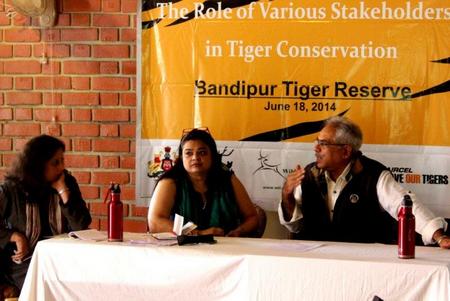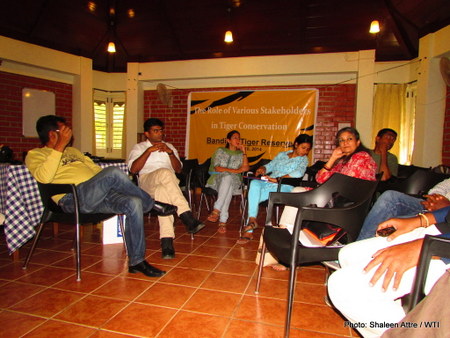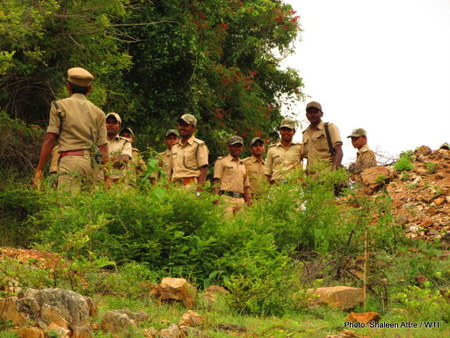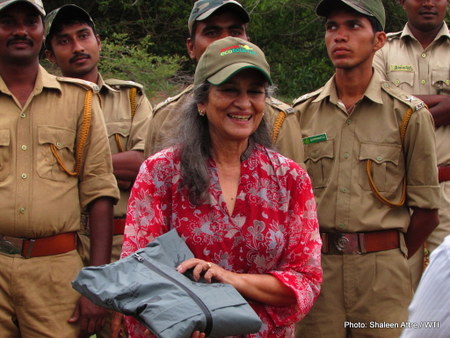Discussing the role of various stakeholders in Bandipur Tiger Reserve
Bangalore, June 19, 2014: A workshop discussing the role of various stakeholders in tiger conservation was organised at Bandipur Tiger Reserve by Wildlife Trust of India (WTI) and Aircel in association the Forest Department. The workshop brought together leaders and experts from various fields- Media, Corporate, NGOs and the Government. The workshop comprised of interesting and informative insights on the role of various stakeholders in tiger conservation, especially on human-wildlife conflict situations and wildlife trade control.
PCCF and Chief Wildlife Warden Vinay Luthra commented on bringing together the various stakeholders on such a neutral platform saying, “Clearly there is a need felt for joint responsibility from the side of the media, the corporate, the NGOs and of course the Forest Department, towards the cause of tiger conservation and the road to that is very tough and difficult. However, workshops like these help bring the varying opinions under one roof and enable a strong debate on the same. While is no denying that helping everyone be accountable while safeguarding the tiger’s future is going to take time, it is imperative that the start needs to happen now.”

Left-Right: Maya Sharma (Resident Editor, NDTV, Bangalore), Brinda Malhotra (Head, CSR, Aircel),
Vinay Luthra (PCCF and Chief Wildlife Warden, Karnataka)
Photo: Jose Louies / WTI
Remarking on the important role of media during wildlife emergencies especially in aiding mitigation Shri Luthra added, “We are currently in discussions of having a dedicated spokesperson from our staff for the media. This way transparency and accuracy of information can be ensured, with clarity in communication.”
The work shop facilitated presentations, group discussions and panel discussions that drew upon experiences and insights to work towards the common goal of tiger conservation. The discussions varied from mitigation of human-wildlife conflict situations to trade control and media sensitivity. The role of corporate was also discussed in detail, with the necessity of more holistic CSR activities being one of the mandates being discussed.
Speaking on the occasion, Brinda Malhotra, Head- Corporate Social Responsibility, Aircel, said, “Aircel has been working diligently towards the cause of tiger conservation since 2008. Aircel initiated a 360 degree ‘Save our Tigers’ campaign, which has been very successful in spreading awareness on the cause. Tigers today, are among the ten most endangered species in the world and need active protection. Taking this commitment forward, we have partnered the Wildlife Trust of India on Conflict Mitigation project across key tiger sanctuaries in the country; working closely with communities and the forest department in order to negate the factors that are leading to the decline of Tigers.
She added, “The biggest threats to Tigers in India today are habitat loss and poaching. The poachers hunt bush meat within the sanctuary which further poses a primary threat to tiger prey species like deer, wild boar, gaur etc. The poachers set up traps and snares to hunt which also trap tigers and fatally wound them. The Rapid Action Project aims to prevent poaching in and around the sanctuaries by conducting anti-snare patrols with the support of the Forest Department and WTI.”
 Discussing portrayal of wildlife trade control issues in the media.
Discussing portrayal of wildlife trade control issues in the media.
Photo: Shaleen Attre / WTI
Sustainable and responsible tourism was also one of the topics touched on which seemed to strike a chord with everyone there as Shri Vijay Mohan Raj the Executive Director of Jungle Lodges and APCCF brought together eco-tourism and conservation under one gambit. Shri Kantaraju, the Conservator of Forests, Bandipur National Park also gave a presentation on the park itself while highlighting the challenges faced by the Forest Department especially while tackling wildlife trade and other related illegal activities and how with the help of organisations and individuals like Wildlife Trust of India and Voice for Wildlife, the park has become a safer place for tigers as the monitoring, patrolling and anti-snare walks done on a regular basis are producing desirable results.
The journalists present for the workshop were also taken on a comprehensive anti-snare walk by the STPF and forest staff enabling a deeper understanding of the tough ground situations and challenges faced by staff as they strive to keep the forests of Bandipur snare free.
 The STPF and local field staff ready to embark on the anti-snare walk.
The STPF and local field staff ready to embark on the anti-snare walk.
Photo: Shaleen Attre / WTI
Rapid Action Project raincoats and Hejje equipment were also given by Ms Tara Gandhi, Vice Chairman of WTI and Ms Brinda Malhotra to the forest department in presence of PCCF Vinay Luthra, Shri Kantaraju – Conservator of Forests, Bandipur National Park and Vijay Mohan Raj – Additional PCCF. One of Wildlife Trust of India’s oldest initiatives, Rapid Action Projects (RAP) were started to enable quick response to wildlife emergencies across the country. Through the RAPs, WTI extends support to individuals or grassroots organisations with proven credibility, and works closely with the government to implement short and medium-term interventions to address urgent or critical conservation needs across the country.
Tara Gandhi, the Vice-Chairman of WTI said, “WTI has been committed to the cause of wildlife conservation and welfare for more than 15 years. The pinnacle of such work is the commitment and dedication of people, not only from organisations like ours, but more importantly the forest departments especially the frontline forest staff. It becomes essential to provide them with the necessary resources and support not just to aid them practically as the guardians of the wild but to also boost their morale as they tough out some of the hardest working conditions doing their best to ensure the safety of the jungle and wildlife within.”
She further added, “Enabling discussions like the ones seen today have become a need of the hour as more and more cases of ‘man vs wild’ seem to making the headlines. It helps to get to know the point of view of all the stakeholders in conservation and help build a bridge to a more holistic multi-pronged solution.”
 Ms Tara Gandhi during the handing over ceremony of the RAP raincoats. Photo: Shaleen Attre / WTI
Ms Tara Gandhi during the handing over ceremony of the RAP raincoats. Photo: Shaleen Attre / WTI
Wildlife Trust of India has been working in Karnataka since 2009 primarily on wildlife trade control and has seen a multi-pronged approach which includes community meetings, anti-snare walks, monitoring cattle kills in order to curb secondary poisoning of tigers and surrender and declaration of guns.The anti-snare walks in Bandipur and Nagharhole National Parks have been instrumental in removal of more than six hundred snares laid by local poachers along the periphery of the park.
In South India, Aircel has supported Rapid Action Projects of WTI which comprised anti-poaching drives and awareness campaigns in Meghamalai Wildlife Sanctuary, Tamil Nadu including anti-snare walks as well. In Sathyamanagalm Tiger Reserve – Tamil Nadu, Aircel helped in equipping 278 forest department staff with anti- poaching kits and aided in refurbishing two Rapid Response Unit vehicles in Cauvery Wildlife Sanctuary.
